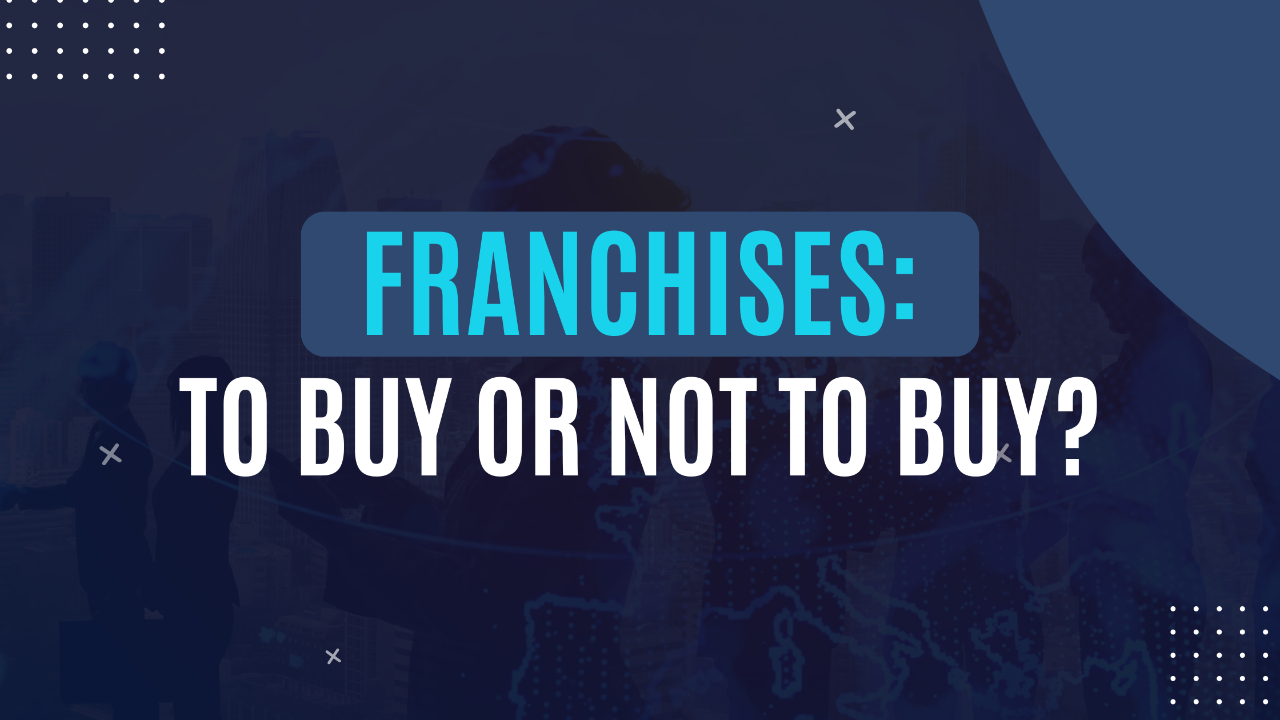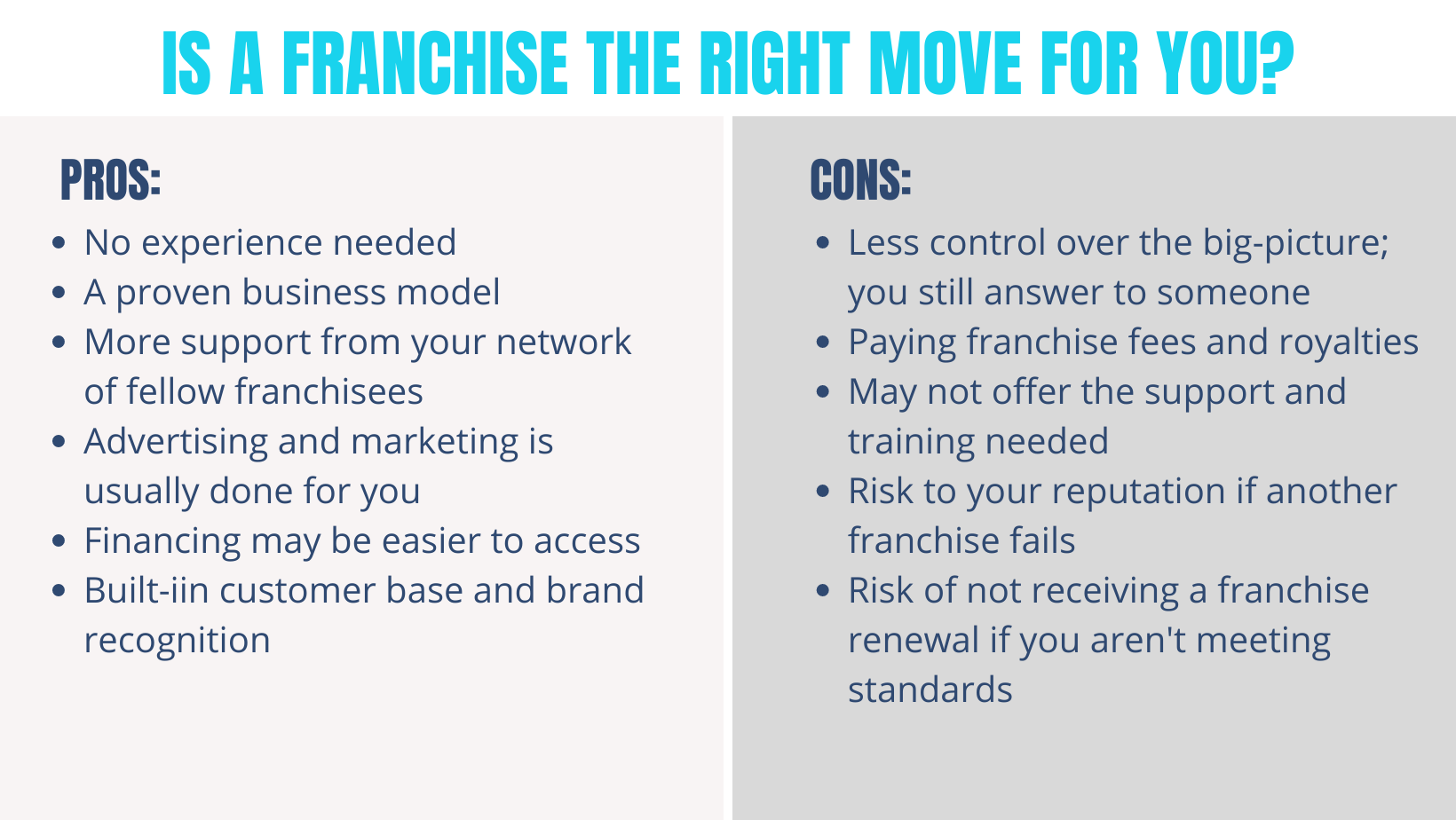Franchises: To buy or not to buy? That is the question.

Buying a business can be a big, life-changing move that will open doors to financial freedom, personal and professional growth, and control over how you spend your time and energy.
It can also be completely overwhelming, especially for first-time owners. Leaving the "safety and security" (perceived safety and security, that is) of a 9-5 job and doing a 180 pivot to owning and running the whole show is a lot to take on.
If you're not quite there yet, but still dream of owning a business, a franchise might just be the way to go. Think of it as ownership with built-in training wheels: You're still doing the pedaling, but you've got some support keeping you upright.
Franchising is big business in the United States. An estimated 753,700 franchise establishments employ over 7 million people and output 670 billion dollars. Everything from quick-service food, real estate, convenience stores, and hair salons are up for grabs. But before you make plans to purchase a Taco Bell to enjoy unlimited cheesy Gorditas, take a look at our Pros and Cons of buying a franchise and make sure it's the right move for you.
The Pros of Buying a Franchise
No experience? No problem. You don't necessarily need prior business experience to run a franchise. That training is typically provided as they will want to familiarize you with their business model and practices.
Proven to work. When you invest in a franchise, you buy into something that has proven to be successful.
More Support. You'll have the opportunity to tap into a vast network of support from other franchisees.
Advertising and marketing. Your franchisor will likely have an entire team dedicated to handling promotions, creating brand standards, placing ads, etc., making it one less thing you have to worry about.
More accessible financing. In some cases, banks or lenders may be more willing to front money for a franchise as they have an established track record.
Built-in customer base. Hopefully, any business you decide to buy will come with legions of dedicated customers. But a franchise, especially one with wide-reaching name recognition, will give you a much larger pool to play in. (Example: The Mom & Pop diner down the street might be a beloved institution for those in the area, but will out-of-town visitors stop there for a quick bite to eat? Or will they opt for the familiarity of a McDonald's?)
The Cons of Buying a Franchise
You're in control, but also NOT in control. This is probably the most apparent drawback of owning a franchise because, at the end of the day, despite being "the owner," you still answer to someone else. You may not have the freedom to adjust business hours or pricing models, or operating processes as you see fit.
Sharing the profits. You're automatically getting a smaller percentage of the revenue due to royalties that must be paid to the franchisor.
Not enough support. Some franchises will do a better job than others at training, supporting, and equipping you to be successful. Some might make big promises but fail to deliver, leaving you scrambling to figure it out on your own.
Risk your reputation. If another franchise performs poorly or gets lousy press or negative reviews, your establishment will likely get lumped in with them. Consumers will only see the business name, not the individual who is responsible.
Longevity isn't guaranteed. Most franchise agreements have a set amount of renewals worked into the contract, but that varies. The decision to renew a franchise agreement is typically up to the franchisor, which means if you're not performing to their standards, they are not obligated to renew it with you.

Like any business transaction of this size, it really comes down to doing your due diligence and research.
- How much can you afford to spend? Remember, you'll need to account for both the startup costs and the franchise fee.
- Is the franchise in a good location?
- Is there room in the market to grow? What is the competition like?
- What type of training and support is offered?
- What is the bottom line? What royalties are going to the franchisor?
- How are other franchisees making out?
- Is the franchise a good fit for your personality or interest level?
- What type of contract is available? How many renewals will be worked into that initial agreement?
- Research the franchise's business model. Does it make sense? Is it something you're willing to go along with?
If you're still on the fence and looking for some guidance, tune in to Episode 30 of The Liquid Lunch Project podcast. We sat down with franchising expert Wes Barefoot. Wes has years of experience as a franchisee and working with franchisors in various roles and now offers consultancy services based on his extensive knowledge. Listen in here.
As the saying goes, there are only two certainties in life, and guaranteed business success is not one of them. Weigh the pros and cons. Seek the advice of others who have walked a similar path. Research, research, research! If you do all these things, you stand a much better chance of positioning yourself for success.



